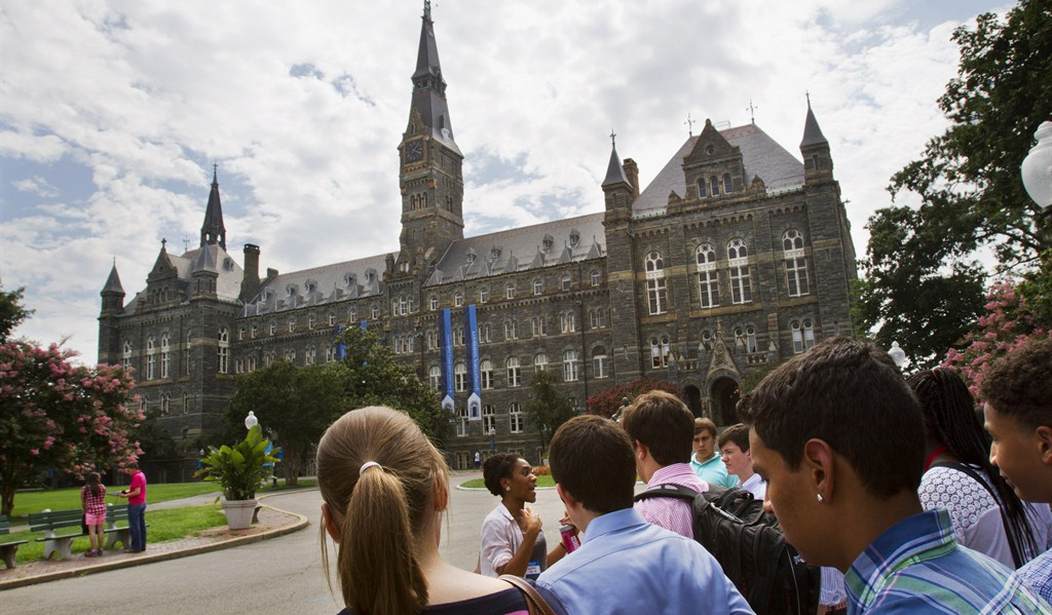The public is steadily losing confidence in undergraduate education, given that we hear constantly about how poorly educated are today's graduates and how few well-paying jobs await them.
The cost of college is a national scandal. Collective student loan debt in America is about $1.2 trillion. Campus political correctness is now daily news.
How could higher education be held accountable and thereby be reformed?
Just as expensive new roofs are not supposed to leak, $100,000 educations should not leave students unprepared for the real world upon graduation. Rain and snow calibrate the effectiveness of a roofer's work, but how does society know whether students' expensive investments in their professors and courses have led to any quantifiable knowledge?
SAT and ACT examinations originated in the 1920s and 1960s, respectively, as meritocratic ways to allow applicants from less prestigious high schools and from minority groups to be assessed on their aptitude for college -- without the old-boy, establishment prejudices of class, gender and race. Would such blind exams also work in reverse as national college exit tests? Could bachelor's degrees be predicated on certifying that graduates possess a minimum level of common knowledge?
Lawyers with degrees can only practice after passing bar exams. Doctors cannot practice medicine upon the completion of M.D. degrees unless they are board certified. Why can't undergraduate degrees likewise be certified? One can certainly imagine the ensuring hysteria.
Recommended
What would happen if some students from less prestigious state schools graduated from college with higher exit-test scores than the majority of Harvard and Yale graduates? What if students still did not test any higher in analytics and vocabulary after thousands of dollars and several years of lectures and classroom hours?
Would schools then cut back on "studies" courses, the number of administrators or lavish recreational facilities to help ensure that students first and foremost mastered a classical body of common knowledge? Would administrators be forced to acknowledge that their campuses had price-gouged students but imparted to them little in return?
Public corporations open their books to shareholders. Shouldn't publicly supported colleges and tax-exempt private universities do the same for taxpayers and tuition-paying students? Shouldn't the public know how much of their contributions are allotted for particular academic departments, sports programs and study centers?
Take out a car or home loan, and there are pages of federal regulations protecting the borrower. Why not give students the same truth-in-advertising protections with the liabilities they will incur?
Schools should inform all enrollees in advance of the prorated costs for a four-, five- or six-year education, including warnings about compounded interest on their debt.
Each school should publicize the percentage of its students who found employment in their particular area of studies -- and after how long, and at what salary. Majoring in media studies is fine, but teenagers entering college should be warned that such jobs have become far more scarce than jobs in engineering or accounting.
The average pay associated with a particular major should be posted. Surely an 18-year-old student should have as much information about borrowing for an education as she does about going into far less debt for a car loan.
Shouldn't campus diversity also be defined far more broadly?
Campuses need not just different races, ethnicities and religions to enrich their intellectual landscapes, but exposure to a wide variety of political and social views as well.
The country is divided 50/50 on most hot-button issues, not 95/5 as it is so often on campus. Life after college is about hearing and tolerating views one doesn't agree with -- not about shouting down dissenting viewpoints in adolescent fashion, or demanding to feel always reaffirmed rather than occasionally uncomfortable.
Why make campuses exempt from realities commonly found elsewhere?
Tech graduates will enter the workplace without guarantees of lifetime tenure at Google. There will be no "safe spaces" for supervisors at GM or Ford where others of a different race cannot enter. Employees at the Department of Veterans Affairs or NASA cannot expect their complaints and accusations to proceed by suspending the due process and free-speech rights of the accused.
No boss at Citibank will issue trigger warnings before ordering subordinates to work harder. Do not tell your supervisor at Comcast that his advice to pick up the pace was a microaggression. Try shouting down or otherwise disrupting a presenter of a new smart-phone product line whom you do not like and see what happens.
Saving the campus from itself is not about doing much that is new or different.
Instead, the challenge is simply forcing colleges that have gone rogue to grow up and to return to the rules and regulations that everyone else follows -- and which they should have long ago abided by as well.

























Join the conversation as a VIP Member